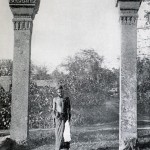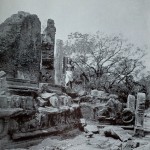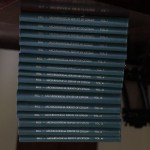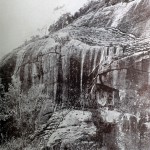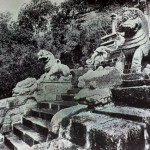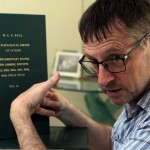Ringing in the New Year with precious gifts from the Bell family
View(s): 246
- H.C.P. Bell’s great-grandson Andrew was here from England to hand over valuable volumes
authored by Sri Lanka’s ‘Father of Archaeology’ to the Royal Asiatic Society
By Kumudini Hettiarachchi
The airline requirement was that one bag could hold only 32kg, but his suitcase weighed 39kg…….and so Andrew “took out a whole pile” and carried them in his backpack all the way from England to Sri Lanka!
“They were very heavy,” he laughs, the task accomplished and the precious gifts handed over to the Royal Asiatic Society (RAS) at the Mahaweli Centre on December 15.
Andrew, the great-grandson of Sri Lanka’s ‘Father of Archaeology’ H.C.P. Bell (Harry Charles Purvis), was in Sri Lanka for this momentous handover, with wife Diana and daughters Iona (18) and Lily (16). Bell was the first Archaeological Commissioner of Ceylon from 1890 to 1912.
Andrew had brought with him Bell’s ‘Archaeological Survey of Ceylon’ from Volume 1 dated 1893 (Report on the Kegalla District – 1892; Research on the Kegalla District – 1893) through to Volume 16 (Supplementary Plates for Annual Reports 1903, 1905, 1906, 1907, 1908, 1909, 1910-11, 1911-12). While a majority are originals, a few are photocopies.
- Annual report 1894 – Anuradhapura – Mayura Pirivena pillars
- Annual Report 1906 – Polonnaruwa – Wata Da Ge
- The collection handed over to RAS: H.C.P Bell’s ‘Archaeological Survey of Ceylon’ Volume 1 to Volume 16
- Annual report 1909 – Sigiri gala
- Annual report 1910-11 -Yapahuwa – Sculpture of third staircase
- Andrew in Colombo: Parting with a family treasure. Pix by M.A. Pushpa Kumara
As we turn the pages and pore over the contents, Andrew says that the volumes are well-maintained. The writing is “dense” but the maps and drawings are meticulous and the black-and-white photographs which have weathered the lapse of time are still crystal clear.
Who would have taken the photographs, we ponder. Was it Bell himself?
In a book titled ‘H.C.P. Bell – Archaeologist of Ceylon and the Maldives’, his granddaughters Bethia and Heather state that he was “self-taught and sublimely self-confident”. He began the official survey, excavation and conservation of the buried cities of Anuradhapura and Polonnaruwa and of the extraordinary rock fortress at Sigiriya. His work in the Ceylon jungles was often carried out “single-handed”, but he once declared, ‘It is good to be a Head Man even in Hell’.
In old age, he realised his dream of proving that a Buddhist civilisation preceded the Muslim conversion of the Maldives, they add.
While Andrew is Bell’s third son Malcolm’s grandson, Bethia and Heather are Bell’s second son Cyril’s daughters. Andrew’s father, Kenneth and Bethia and Heather were first cousins.
It was Rev. Kenneth Bell who not so long ago, with Andrew in tow, returned a revered possession of the Bell family for nearly a century – a beautiful 14-cm seated Buddha carved in wood, which was taken in procession on December 17, 2019 from the Queen’s Hotel to the Sri Dalada Maligawa (the Temple of the Sacred Tooth Relic) in Kandy.
This time round, the bearer of this many-hued intricately carved statue, now 93, not able to undertake the long air journey had sent Andrew as his emissary.
This ‘collection’ had been passed down to Heather at the time of Bell’s death and had been preserved by her until her death. Thereafter, it had been passed onto Andrew and the collection was “sitting on my shelf” for about two years.
“I wondered what the best thing to do would be and it was to return this ‘family treasure’ to Sri Lanka,” he says.
Andrew who lives in Exeter, southwest England, and is the Press Officer of the Green Party, is no stranger to Sri Lanka. Not only did he accompany his Dad when he brought the Buddha statue in 2019 but he had also visited this country about 27 years ago when his sister, Fiona, was working in Colombo. Now daughter Iona is planning to be part of a conservation group down south during her gap year.
We go down memory lane to what Andrew’s Dad (Kenneth) who had lived in Sri Lanka with Bell had told them about him……..Bell’s two-storey home in the hills above Kandy Lake had had an aviary as the archaeologist had a deep interest in birds.
“Sri Lanka was H.C.P. Bell’s country and home. It was only right for the books to come home as this was the place he loved dearly. We hope these valuable volumes would be preserved and looked after by the RAS and made accessible to researchers,” is Andrew’s simple request.
Why the RAS? The reply comes promptly – Bell had been a very active member of the RAS, joining it in 1880 and quickly taking on the duties of its Secretary, which post he had held for 34 long years. He had also been the Editor of the RAS Journal.
Bell who had arrived in Sri Lanka in 1873, made this country his much-loved second home. On his death in 1937, he had been buried here according to his wishes.

